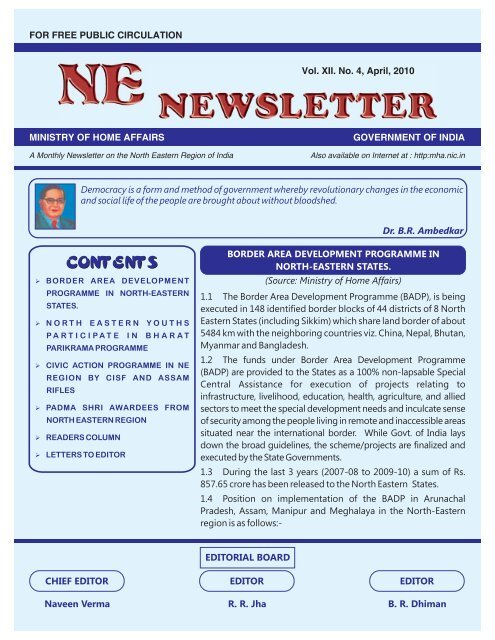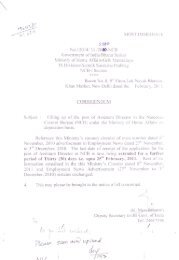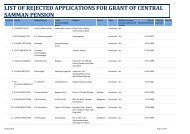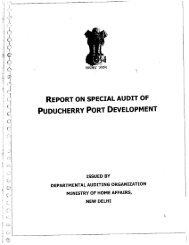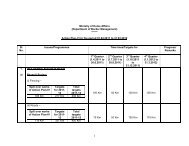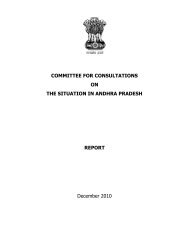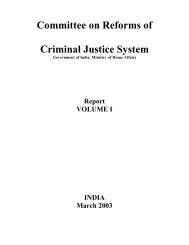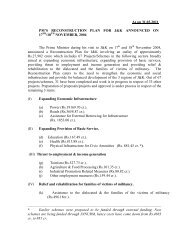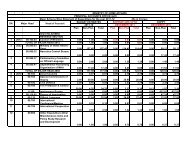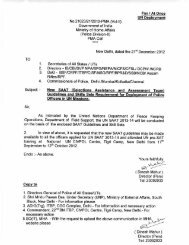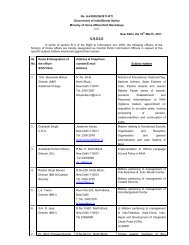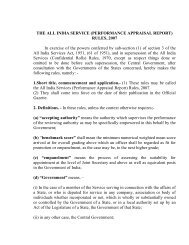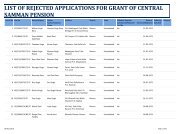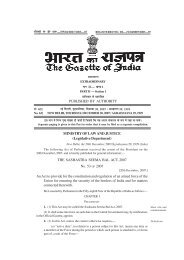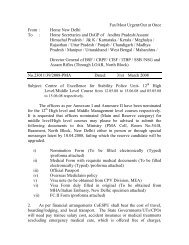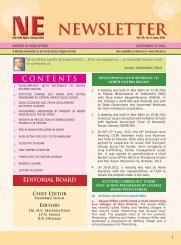April-2010 - Ministry of Home Affairs
April-2010 - Ministry of Home Affairs
April-2010 - Ministry of Home Affairs
You also want an ePaper? Increase the reach of your titles
YUMPU automatically turns print PDFs into web optimized ePapers that Google loves.
FOR FREE PUBLIC CIRCULATION<br />
Vol. XII. No. 4, <strong>April</strong>, <strong>2010</strong><br />
MINISTRY OF HOME AFFAIRS GOVERNMENT OF INDIA<br />
A Monthly Newsletter on the North Eastern Region <strong>of</strong> India Also available on Internet at : http:mha.nic.in<br />
Democracy is a form and method <strong>of</strong> government whereby revolutionary changes in the economic<br />
and social life <strong>of</strong> the people are brought about without bloodshed.<br />
CONTENTS<br />
BORDER AREA DEVELOPMENT<br />
PROGRAMME<br />
STATES.<br />
IN NORTH-EASTERN<br />
NORTH EASTERN YOUTHS<br />
PARTICIPATE IN BHARAT<br />
PARIKRAMA PROGRAMME<br />
CIVIC ACTION PROGRAMME IN NE<br />
REGION<br />
RIFLES<br />
BY CISF AND ASSAM<br />
PADMA SHRI AWARDEES FROM<br />
NORTH EASTERN REGION<br />
READERS COLUMN<br />
LETTERS TO EDITOR<br />
EDITORIAL BOARD<br />
Dr. B.R. Ambedkar<br />
1.1<br />
BORDER AREA DEVELOPMENT PROGRAMME IN<br />
NORTH-EASTERN STATES.<br />
(Source: <strong>Ministry</strong> <strong>of</strong> <strong>Home</strong> <strong>Affairs</strong>)<br />
The Border Area Development Programme (BADP), is being<br />
executed in 148 identified border blocks <strong>of</strong> 44 districts <strong>of</strong> 8 North<br />
Eastern States (including Sikkim) which share land border <strong>of</strong> about<br />
5484 km with the neighboring countries viz. China, Nepal, Bhutan,<br />
Myanmar and Bangladesh.<br />
1.2 The funds under Border Area Development Programme<br />
(BADP) are provided to the States as a 100% non-lapsable Special<br />
Central Assistance for execution <strong>of</strong> projects relating to<br />
infrastructure, livelihood, education, health, agriculture, and allied<br />
sectors to meet the special development needs and inculcate sense<br />
<strong>of</strong> security among the people living in remote and inaccessible areas<br />
situated near the international border. While Govt. <strong>of</strong> India lays<br />
down the broad guidelines, the scheme/projects are finalized and<br />
executed by the State Governments.<br />
1.3 During the last 3 years (2007-08 to 2009-10) a sum <strong>of</strong> Rs.<br />
857.65 crore has been released to the North Eastern States.<br />
1.4 Position on implementation <strong>of</strong> the BADP in Arunachal<br />
Pradesh, Assam, Manipur and Meghalaya in the North-Eastern<br />
region is as follows:-<br />
CHIEF EDITOR EDITOR<br />
EDITOR<br />
Naveen Verma R. R. Jha<br />
B. R. Dhiman
BADP in Arunachal Pradesh<br />
1.1 BADP is being implemented in 37 blocks <strong>of</strong> 12<br />
border districts <strong>of</strong> Arunachal Pradesh. State<br />
Government has utilized funds mainly on<br />
construction <strong>of</strong> School buildings, hostels,<br />
Construction <strong>of</strong> Public Health Centers (PHCs),<br />
purchase <strong>of</strong> Ambulances, mobile dispensaries,<br />
construction <strong>of</strong> community centres , construction <strong>of</strong><br />
roads, paths, culverts and bridges, tracks, mule<br />
tracks, social infrastructure, forest conservation,<br />
drinking waters facilities and power generation<br />
through micro hydel projects.<br />
1.2 Allocation, Releases and Utilization <strong>of</strong> funds under BADP:<br />
During <strong>2010</strong>-11 an amount <strong>of</strong> Rs. 5850.00 lakh<br />
has been allocated under BADP<br />
1.3 Besides the schemes/projects included by the<br />
State Government in the Annual Action Plan <strong>of</strong> BADP,<br />
additional works amounting to Rs. 1875 lakh during<br />
2007-08 and Rs. 4695 lakh during 2008-09 have<br />
been sanctioned over and above the allocation <strong>of</strong><br />
the State out <strong>of</strong> the savings. During the year 2009-<br />
10, an amount <strong>of</strong> Rs. 800.00 lakh has been<br />
sanctioned for various works.<br />
2. BADP in Assam:<br />
2.1 BADP is being implemented in 28 blocks <strong>of</strong><br />
07 border districts <strong>of</strong> Assam. State Government<br />
utilized funds under BADP mainly on<br />
construction <strong>of</strong> school buildings, construction <strong>of</strong><br />
public health centres (PHCs), construction <strong>of</strong><br />
community centre, construction <strong>of</strong> roads, paths,<br />
culverts and bridges, social infrastructure and<br />
drinking water facilities.<br />
2.2 Allocation, Releases and Utilization <strong>of</strong> funds under BADP:<br />
During <strong>2010</strong>-11 an amount <strong>of</strong> Rs. 2424 lakh has<br />
been allocated for BADP Schemes.<br />
3. BADP in Manipur<br />
3.1 BADP is being implemented in 8 border blocks<br />
<strong>of</strong> 3 border districts <strong>of</strong> Manipur. State Govt. has<br />
2<br />
utilized funds under BADP mainly on construction <strong>of</strong><br />
school buildings, construction <strong>of</strong> public health<br />
centres (PHCs), construction <strong>of</strong> community centers,<br />
construction <strong>of</strong> roads, paths, culverts and bridges,<br />
social infrastructure, drinking waters facilities etc.
3.2 Allocation, Release and Utilization <strong>of</strong> funds under BADP<br />
During <strong>2010</strong>-11 an amount <strong>of</strong> Rs. 1343.00 lakh<br />
has been allocated for BADP schemes.<br />
3.3 Besides the schemes/projects included by the<br />
State Government in the Annual Action Plan <strong>of</strong> BADP,<br />
additional works amounting to Rs. 300 lakh during<br />
2007-08 and Rs. 750 lakh during 2009-10 have been<br />
sanctioned over and above the allocation <strong>of</strong> the<br />
State out <strong>of</strong> the savings.<br />
3<br />
4. BADP in Meghalaya<br />
4.1 BADP is being implemented in 10 blocks <strong>of</strong> 05<br />
border districts <strong>of</strong> Meghalaya. State Government<br />
has utilized funds under BADP mainly on<br />
construction <strong>of</strong> school buildings, construction <strong>of</strong><br />
public health centres, construction <strong>of</strong> roads/paths,<br />
culverts and bridges, social infrastructure, and<br />
fisheries.<br />
4.2 Allocation, Releases and Utilization <strong>of</strong> funds under BADP;<br />
During <strong>2010</strong>-11 an amount <strong>of</strong> Rs. 1247.00 lakh<br />
has been allocated for BADP schemes.<br />
4.3 Besides the schemes/projects included by the<br />
State Government in the Annual Action Plan <strong>of</strong> BADP,<br />
additional works amounting to Rs. 98.80 lakh during<br />
2007-08 and Rs. 400.19 lakh during 2009-10 have<br />
been sanctioned over and above the allocation <strong>of</strong><br />
the State out <strong>of</strong> the savings.<br />
(Details <strong>of</strong> BADP programme in Mizoram, Nagaland,<br />
SikkimandTripuratobecontinuedinthenextissue.)<br />
NORTH EASTERN YOUTHS PARTICIPATE IN BHARAT PARIKRAMA PROGRAMME<br />
During 2009-10, <strong>Ministry</strong> <strong>of</strong> <strong>Home</strong> <strong>Affairs</strong><br />
supported 05 major programmes through Nehru Yuva<br />
Kendra Sangathan (NYKS) in North Eastern States<br />
namely Knit India Yuva Yatra Programme, Bharat<br />
Parikrama Programme, North Eastern Music Concert<br />
programme, Street Theater / Kala Jatha Campaign for<br />
local peace and harmony and life skills programme.<br />
Bharat Parikrama Programme, one <strong>of</strong> the Knit<br />
India Yuva Yatra programmes was organized by<br />
(Source: NYKS)<br />
Nehru Yuva Kendra Sangathan. Under this<br />
programme 77 North Eastern Youths (45 male & 32<br />
female) selected from 08 States <strong>of</strong> North East India<br />
alongwith 04 <strong>of</strong>ficial escorts were provided<br />
opportunities to visit important places which<br />
included Kolkata (West Bengal), Bhubaneswar<br />
(Orissa), Bhopal (Madhya Pradesh), Delhi and<br />
Lucknow (Uttar Pradesh). A series <strong>of</strong> meaningful<br />
interactive programmes and activities as well as field
visits were organized. A brief summary <strong>of</strong> Bharat<br />
Parikrama Programme is as follows:<br />
At Kolkata the Bharat Parikrama Participants<br />
th th<br />
stayed for 03 days from 5 to 7 March, <strong>2010</strong>. Here,<br />
they got the opportunity to visit Krishi & Shilp<br />
Mela, International Kolkata Book Fair and interact<br />
with students <strong>of</strong> Ramakrishna Vivekananda<br />
University and Shri D.P.Ray, Ex M.P and former<br />
member <strong>of</strong> NYKS, Board <strong>of</strong> Governors. Shri Ray<br />
called upon the North Eastern youth to shun their<br />
regional differences and broden their knowledge &<br />
information about people living in different parts<br />
<strong>of</strong> India and develop appreciation <strong>of</strong> their distinct<br />
life style, tradition and culture by taking full<br />
advantage <strong>of</strong> the opportunities to travel different<br />
places <strong>of</strong> India. The participants visited famous<br />
market places, Netaji Park, Victoria Memorial &<br />
also saw Howrah Bridge, Eden Garden etc.<br />
The Bharat Parikrama Participants arrived at<br />
th<br />
BHUBANESHWAR on 8 March, <strong>2010</strong> and stayed<br />
th th<br />
from 8 to 10 March, <strong>2010</strong>. The participants visited<br />
KIIT AND KISS UNIVERSITY founded by Dr. A.<br />
Samanta. The university provides free education and<br />
vocational Training in various trades to about 10000<br />
Tribal Students including students from North East.<br />
During their 03 days stay, they also met His<br />
Excellency Governor <strong>of</strong> Orissa Shri Murlidhar<br />
Chandrakant Bhandare who lauded the joint efforts<br />
<strong>of</strong> MHA and NYKS for creating opportunity for a<br />
group <strong>of</strong> youths from North Eastern States to visit<br />
different places <strong>of</strong> India. As part <strong>of</strong> their field visit,<br />
participants visited the famous “ADIVASHI MELA,<br />
<strong>2010</strong>”, Santi Stupa(Peace pagoda) Dhauligiri, Konark<br />
Temple, Lord Jagannath Temple at Puri, Udaygiri<br />
Khandagiri caves and Puri Beach etc.<br />
th<br />
The Participants arrived at BHOPAL on 11<br />
th<br />
March, <strong>2010</strong> and stayed for 04 days i.e. upto 15<br />
March, <strong>2010</strong>. Pr<strong>of</strong>. P.B. Sharma,Vice Chancellor <strong>of</strong><br />
Delhi Technical University, Captain V.P.<br />
4<br />
Singh(retired)-Eminent Social Worker, Digvijay<br />
Singh-Ex Chief Minister <strong>of</strong> MP, and other dignitaries<br />
addressed the participants. Pr<strong>of</strong>. P.B. Sharma<br />
highlighted the various aspects <strong>of</strong> national<br />
integration and the need for assimilation <strong>of</strong> different<br />
cultures <strong>of</strong> India and promotion <strong>of</strong> peace and ethnic<br />
harmony in North East India. Participants also visited<br />
T.T.Nagar market, famous Shiva Temple and Bhopal<br />
Lake. Before their departure to Delhi, participants<br />
also met his Excellency Governor <strong>of</strong> Madhya Pradesh<br />
Shri Rameshwar Thakur.<br />
In DELHI, the <strong>of</strong> participants on the very first day<br />
th<br />
<strong>of</strong> their arrival at Delhi on 16 <strong>of</strong> March, <strong>2010</strong>, had<br />
interaction with Shri G.K.Pillai, <strong>Home</strong> Secretary and<br />
Shri. Naveen Verma, Joint Secretary (North East) and<br />
other <strong>of</strong>ficials <strong>of</strong> <strong>Ministry</strong> <strong>of</strong> <strong>Home</strong> <strong>Affairs</strong> at North<br />
Block. All the team leaders shared their experiences<br />
<strong>of</strong> the journey and said that wherever they passed<br />
through any public or market place people in<br />
general treated them as if they were foreigners but<br />
when they came to know that “We are youths from<br />
North East India, they wondered with great<br />
happiness. And, the kind <strong>of</strong> love and respect people<br />
showered on us at every place, we felt proud to be an<br />
Indian.” <strong>Home</strong> Secretary told them about the<br />
vastness <strong>of</strong> India and linguistic & cultural differences<br />
which can only be bridged by progressive young<br />
generation <strong>of</strong> this country. He also asked them to<br />
visit President House and other Historical Places <strong>of</strong><br />
Delhi during their 04 days stay in Delhi.<br />
The participants visited Rashtpati Bhawan and<br />
Mugal Garden as well as Gandhi Smriti at 30 January<br />
Marg, apart from Teen Murti, Qutub Minar, Lotus<br />
Temple, Rajghat, Kishanghat, Samata Sthal, Chandini<br />
Chowk, Lal Quila etc.<br />
On 20.3.<strong>2010</strong> in LUCKNOW the participants<br />
interacted with the participants <strong>of</strong> National<br />
Integration Camp organized by NYKS UP Zone.
Shri B.B. Chobal, Chief General Manager <strong>of</strong> SBI,<br />
addressed the joint gathering on the role <strong>of</strong> banking<br />
sector for social and economic welfare <strong>of</strong> young<br />
persons. The participants visited Deva Sharif Dargah,<br />
Yuba Bikash Kendra and Jahangirabad Educational<br />
Trust Group <strong>of</strong> Institutions in Barabanki District. They<br />
interacted with District Magistrate <strong>of</strong> Barabanki.<br />
Participants also visited important historical, religious<br />
and social places like “Samajik Prajyatan Sthal,<br />
Ambedkar Park, Bhool-Bhulaiyan and famous<br />
Residency Palace associated with 1857 First War <strong>of</strong><br />
Independence situated in different parts <strong>of</strong> Lucknow.<br />
(Source: <strong>Ministry</strong> <strong>of</strong> <strong>Home</strong> <strong>Affairs</strong>)<br />
5<br />
The Closing Function <strong>of</strong> Bharat Parikrama<br />
rd<br />
Programme was held on 23 March, <strong>2010</strong>. Dr. Lalit<br />
Burma, Principal Secretary, Department <strong>of</strong> Youth<br />
Welfare, Govt. <strong>of</strong> UP, Shri S.A.Khan, Director General,<br />
(Youth Welfare) and Shri Nand Gopal Gupta 'Nandi',<br />
Minister <strong>of</strong> Institutional Finance (Govt. <strong>of</strong> UP) were<br />
present on the occasion and all <strong>of</strong> them highlighted<br />
the necessity to organize such youth exchange<br />
programmes and appealed to the youths from<br />
different districts <strong>of</strong> North East to carry with them<br />
the most vital and important message to believe in<br />
the merit <strong>of</strong> the Indian democracy and build a<br />
modern progressive and peaceful North East India.<br />
CIVIC ACTION PROGRAMME IN NORTH EASTERN REGION<br />
CENTRAL INDUSTRIAL SECURITY FORCE<br />
(a) On 18.2.<strong>2010</strong>, CISF organized a 'Free Medical<br />
Camp' for the public <strong>of</strong> Salakab and surrounding<br />
villages in co-operation with PGCIL Management. The<br />
Camp was inaugurated by, Dy. General Manager,<br />
SBSS/PGCIL Salakati and about 400 people from<br />
nearby villages availed medical treatment. The<br />
medicines were supplied by the Director, Medical &<br />
Health <strong>of</strong> District, Kokrajhar and Chirang (Assam) for<br />
free distribution amongst the villagers. The<br />
sponsoring managements had also procured<br />
medicines worth Rs. 16,000/- for free distribution in<br />
the Camp. In their closing address, organizers were all<br />
praise for CISF personnel for their assistance in making<br />
the Camp a success. Several noted Physicians and<br />
specialists from the Districts <strong>of</strong> Kokrajhar and Chirang<br />
rendered assistance by providing free medical<br />
services for the said Camp.<br />
(b) On 2.3.<strong>2010</strong>, a world Harmony Rally (Vishwa<br />
Sadhavana daud) was organized at Sibsagar District<br />
(Assam) wherein representatives <strong>of</strong> different<br />
religious organizations put forth their views on the<br />
need and importance <strong>of</strong> 'World Harmony'.<br />
(c) On 6.3.<strong>2010</strong>, a Cycle Rally was conducted by CISF<br />
Unit OPS Noonmati (Assam) personnel in the market<br />
area <strong>of</strong> Narangi and Patharquary to spread<br />
awareness in public regarding the importance <strong>of</strong><br />
security in general public life.
CIVIC ACTION PROGRAMME IN NE REGION BY ASSAM RIFLES IN THE<br />
MONTH OF MARCH <strong>2010</strong><br />
(Source: DG ASSAM RIFLES)<br />
Churachandpur<br />
PADMA SHRI AWARDEES FROM NORTH EASTERN REGION<br />
Shri Arun Sarma<br />
Shri Arun Sarma, one <strong>of</strong> the most versatile<br />
dramatists <strong>of</strong> Assam who has been instrumental in<br />
shaping modern Assamese drama is equally at home<br />
in the medium <strong>of</strong> creative writing and is a significant<br />
novelist <strong>of</strong> the present times. His novels are very<br />
sensitive and <strong>of</strong> the classical mould, wide in their<br />
scope, rich and varied in their characterization and<br />
drama. A harbinger <strong>of</strong> modernity in Assamese drama,<br />
he is one <strong>of</strong> those rare writers who observe the world<br />
with a clinical detachment but with sensitive concern.<br />
rd<br />
2. Born on 3 November, 1931, Shri Sarma<br />
graduated from Cotton College, Guwahati, Assam.<br />
He joined the Guwahati Station <strong>of</strong> All India Radio in<br />
1960 as Producer, Educational Broadcast and retired<br />
as Director, North Eastern Service <strong>of</strong> All India Radio<br />
in 1989. He was then Editor <strong>of</strong> 'Purbanchal', a weekly<br />
news magazine from where after two years, he<br />
became Director <strong>of</strong> the Information service (Tea<br />
Centre) <strong>of</strong> India Tea Association, Calcutta.<br />
3. Shri Sarma is a renowned broadcaster specializing<br />
in educational programmes with his 6-month training<br />
in BBC, London. He is also a well known radio<br />
playwright with about fifty radio plays to his credit and<br />
an ace radio documentary programme maker. He has<br />
been President <strong>of</strong> Asom Natya Sanmilan, the largest<br />
6<br />
drama organization in the North East <strong>of</strong> India for five<br />
years and is now associated with a number <strong>of</strong><br />
important state and national level social, literary and<br />
cultural advisory committees.<br />
4. Shri Sarma has the distinction <strong>of</strong> having received<br />
Sahitya Akademi award for literature and Sangeet<br />
Natak Akademi award for his contribution to drama.<br />
He also received Assam Valley Literary award<br />
instituted by Williamson Magor Education Trust in<br />
recognition <strong>of</strong> his lifetime achievement in the field <strong>of</strong><br />
literature. He has also received Assam Sahitya Sabha<br />
(Drama) award and Assam Natya Sanmilan award.<br />
He is also recipient <strong>of</strong> international awards like Japan<br />
Prize International, Asia Pacific Broadcasting Union
(ABU) award and Prix Future Berlin award for his<br />
documentaries dealing with subjects like distressed<br />
children and environment.<br />
Smt. Haobam Ongbi Ngangbi Devi<br />
Smt. Haobam Ongbi Ngangbi Devi has been<br />
among the foremost exponents <strong>of</strong> Manipuri Ras. She<br />
received her initial training in Ras Leela, Nata<br />
Sankirtan and Lai-Haraoba from renowned gurus<br />
including Maishnam Amubi Singh, Haobam Atomba<br />
Singh and Kshestrimayum Ojha Bidhu Singh and the<br />
Manipuri martial arts from Ojha Pheijao Sana and<br />
Ojha Damu Singh.<br />
2. Born on August 1, 1924 in Imphal, Manipur, Smt.<br />
Ngangbi Devi joined Jawaharlal Nehru Manipur Dance<br />
Academy, Imphal in 1954 as a musician and over the<br />
years gained eminence as a teacher and performer. She<br />
also won wide popularity in Manipur as Ras Leela<br />
performer, excelling in dance as well as in vocal. Smt.<br />
Ngangbi Devi served as Vice-Principal <strong>of</strong> Jawaharlal<br />
Nehru Manipur Dance Academy from 1973 to 1985,<br />
where she trained a large number <strong>of</strong> students who are<br />
leading performers at present. In 1936 and 1937, she<br />
also performed as an actress in the Manipur Dramatic<br />
Union (MDU) and Aryan Theatre, leading theatre groups<br />
<strong>of</strong> Manipur. Smt. Ngangbi Devi visited Rangoon in 1964<br />
as member <strong>of</strong> the Indian cultural delegation sponsored<br />
bytheGovernment<strong>of</strong>India.<br />
3. Smt. Ngangbi Devi was awarded Gold medal and<br />
Birangana in 1951 by the Governor <strong>of</strong> Assam for her<br />
excellent dance performance. She was honoured with<br />
Manipur State Kala Akademi Award in 1980; Nritya<br />
Bhushan by the Manipur Sahitya Parishad in 1985.<br />
She also received the Sangeet Natak Adademi award<br />
in 1993 for her contribution to Manipur Ras in 1994.<br />
7<br />
Shri Rajkumar Achouba Singh<br />
Shri Rajkumar Achouba Singh, former Principal,<br />
Jawaharlal Nehru Manipur Dance Academy, Imphal<br />
and Baar Senapati <strong>of</strong> Manipur Gondajee Temple<br />
Board, Imphal is widely recognized as a leading<br />
scholar and Guru in Manipuri dance specially in Ras<br />
and Laiharaoba. He has been playing pioneering role<br />
in dance, music and direction specially dance drama<br />
for the last 40 years.<br />
2. Born on December, 5, 1938, Shri Rajkumar<br />
obtained diploma in Manipuri dance in 1972, post<br />
graduate degree in Leiharaoba and post graduate<br />
degree in Ras from J.N. Manipur Dance Academy,<br />
Imphal in 1974. He has been visiting Guru at<br />
Govindajee Natralaya, Government Dance College,<br />
Imphal.<br />
3. Shri Rajkumar has been Founder-Honorary<br />
Director <strong>of</strong> Anoi Shindampham Imphal since 2003.<br />
He has visited all capital cities <strong>of</strong> India with<br />
Manipuri Cultural troupes in the last 45 years and<br />
also visited South Korea, Phillippines and Thailand<br />
with Indian contingents. Shri Rajkumar also served<br />
as a regular guest lecturer on Manipuri Dance with<br />
attachment training for IAS probationers from<br />
2007-2009.<br />
4. Shri Rajkumar Achouba authored books on Penna<br />
Anoi based on dance and music <strong>of</strong> Manipuri culture in<br />
1997. He has also been a regular writer and contributor<br />
toleadingnationaljournalsonheritage<strong>of</strong>Manipur.<br />
5. Shri Rajkumar is recipient <strong>of</strong> many awards and<br />
honours. He was conferred fellowship on Laiharaoba<br />
Dance by the Manipur State Kala Academy Imphal in<br />
1972 and State Award on Laiharaoba Dance in 1996.<br />
He has been a member, Eastern Zone Cultural<br />
Centre, Calcutta and North Eastern Zone Cultural<br />
Centre Dimapur, Nagaland.
READERS COLUMN<br />
The NE monthly Newsletter is being published in<br />
English, Assamese, Bengali and Manipuri and has<br />
circulation <strong>of</strong> 40,000. <strong>Ministry</strong> <strong>of</strong> <strong>Home</strong> <strong>Affairs</strong> brings out<br />
the publication incorporating important<br />
information/developments concerning North Eastern<br />
States.<br />
<strong>Ministry</strong> <strong>of</strong> <strong>Home</strong> <strong>Affairs</strong>, through the Newsletter,<br />
would request for inputs for the Newsletter from the<br />
Government agencies, institutions and individuals<br />
highlighting the area specific issues, problems, special<br />
features including potential for tourism,<br />
environmental protection or special<br />
efforts/achievement in various fields. The views and<br />
write ups from intellectuals, pr<strong>of</strong>essionals and others<br />
from the North-Eastern States are also invited on<br />
specific issues/problems and possible measures for<br />
resolution thereto.<br />
RNI Reg. No. R-72398/99<br />
It is requested that specific<br />
articles/columns should be sent<br />
in a hard copy format<br />
accompanied by floppy/CD<br />
version alongwith photographs.<br />
Articles should be accompanied<br />
by an abstract <strong>of</strong> a maximum <strong>of</strong><br />
150-200 words. Papers should<br />
not have been simultaneously<br />
submitted for publication to<br />
another journal or News paper.<br />
Readers are encouraged to send<br />
comments and suggestions<br />
(300-400 words) on published<br />
articles. All letters should have<br />
the writer's full name and postal address. The selected articles will<br />
be suitably incorporated in the monthly NE Newsletter in its<br />
subsequent editions and contribution will be welcomed and<br />
suitablyrewarded.<br />
LETTERS TO EDITOR<br />
I come across your NE Newsletter vol. no. 12, December 2009 today and I find it very interesting, it talks about<br />
many issues<br />
I would like to request you to kindly send me English copy at the following address.<br />
Namdithiu pamei, Tharon,<br />
Thangmeiband, Imphal West 795001<br />
Manipur.<br />
2. We would greatly appreciate receiving a reprint or a copy <strong>of</strong> your “NE Newsletter” published recently.<br />
Reprints <strong>of</strong> your other (all the recent ones) papers on the same or similar subject would be very much<br />
appreciated. Our address can also be included in you mailing list.<br />
Thanking for your cooperation.<br />
The President,<br />
Pondicherry Post – Graduates in Ecology &<br />
Environmental Sciences Association,<br />
Reg No. 365/2003.<br />
Srimivasa Cunderl Sl,<br />
Sellepaumrl, Lawspet Post,<br />
Pondicherry – 605008.<br />
3. I shall be highly obliged, if you would kindly include me in the permanent mailing list <strong>of</strong> NE Newsletter<br />
for life subscription. If so, I remain thankful to you, always.<br />
Further, I humbly beg you to kindly send me your regular promotional materials from time to time, including<br />
complementary copies <strong>of</strong> book <strong>of</strong> North East in particular (published by NE Division, MHA). Thanking you in anticipation.<br />
Lian Chinthang Gwite<br />
Guite Ville, Mualveng<br />
Upper Lamka, P.O. Box 19<br />
Vialzachyn – 795128.<br />
Manipur (North East India).<br />
MHA requests the readers to send their response through e-mail at: nenchiefeditor@nic.in/neneditor@nic.in/donedc-mha@nic.in<br />
Request for free copy <strong>of</strong> the NE Newsletter indicating language preferred or suggestions, if any,<br />
may be sent to the chief Editor/Editor at the address given below:<br />
Edited and Published by N.E. Division, <strong>Ministry</strong> <strong>of</strong> <strong>Home</strong> <strong>Affairs</strong>, North Block, New Delhi-110 001<br />
Printed by: I G Printers Pvt. Ltd.,104, DSIDC Okhla Phase-I, N.D.-20, Ph.: 26810297


